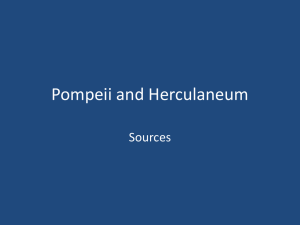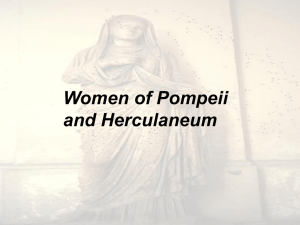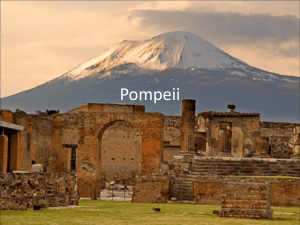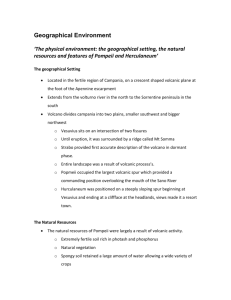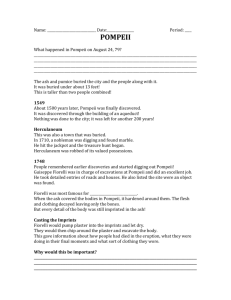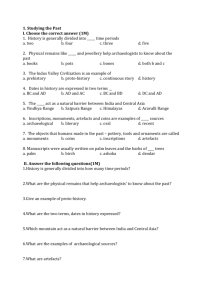pompeii inscriptions and graffiti
advertisement
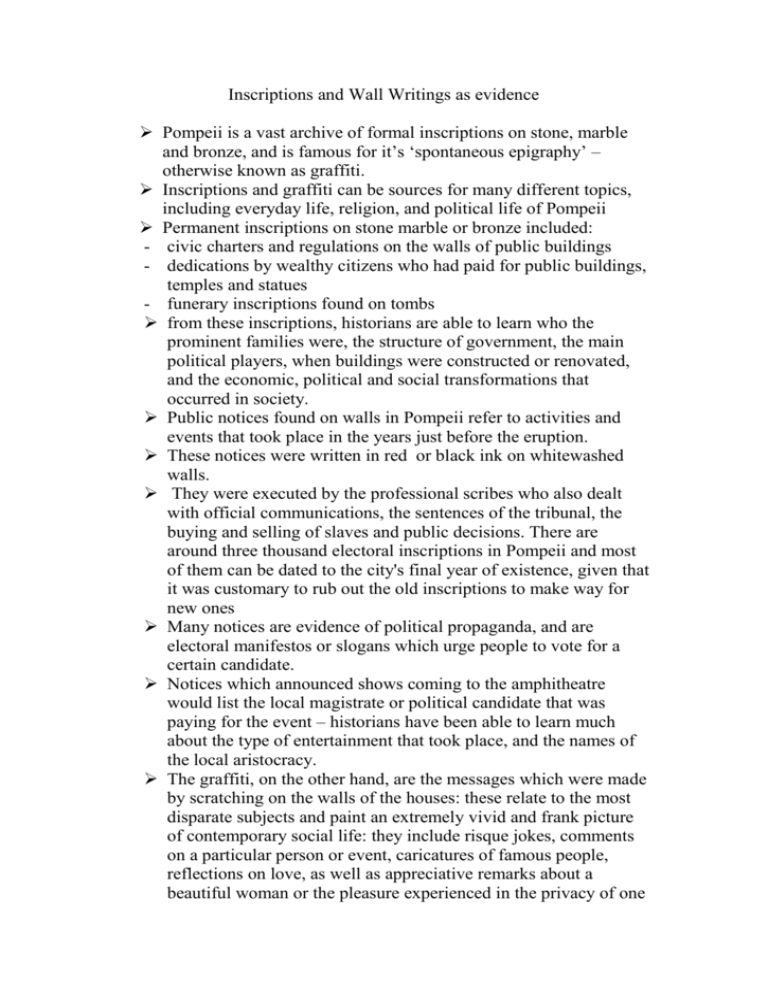
Inscriptions and Wall Writings as evidence Pompeii is a vast archive of formal inscriptions on stone, marble and bronze, and is famous for it’s ‘spontaneous epigraphy’ – otherwise known as graffiti. Inscriptions and graffiti can be sources for many different topics, including everyday life, religion, and political life of Pompeii Permanent inscriptions on stone marble or bronze included: - civic charters and regulations on the walls of public buildings - dedications by wealthy citizens who had paid for public buildings, temples and statues - funerary inscriptions found on tombs from these inscriptions, historians are able to learn who the prominent families were, the structure of government, the main political players, when buildings were constructed or renovated, and the economic, political and social transformations that occurred in society. Public notices found on walls in Pompeii refer to activities and events that took place in the years just before the eruption. These notices were written in red or black ink on whitewashed walls. They were executed by the professional scribes who also dealt with official communications, the sentences of the tribunal, the buying and selling of slaves and public decisions. There are around three thousand electoral inscriptions in Pompeii and most of them can be dated to the city's final year of existence, given that it was customary to rub out the old inscriptions to make way for new ones Many notices are evidence of political propaganda, and are electoral manifestos or slogans which urge people to vote for a certain candidate. Notices which announced shows coming to the amphitheatre would list the local magistrate or political candidate that was paying for the event – historians have been able to learn much about the type of entertainment that took place, and the names of the local aristocracy. The graffiti, on the other hand, are the messages which were made by scratching on the walls of the houses: these relate to the most disparate subjects and paint an extremely vivid and frank picture of contemporary social life: they include risque jokes, comments on a particular person or event, caricatures of famous people, reflections on love, as well as appreciative remarks about a beautiful woman or the pleasure experienced in the privacy of one of the rooms in the brothel. In addition there are several which are concerned with the buying and selling of materials or livestock and the calculation of merchandise. Many refer to the entertainments on offer in the city or are in praise of the champions put to the test in the gladiatorial games. A collection of ancient Roman graffiti immortalised in ash at Pompeii, which shows that people are the same, no matter where, or when, they live. (exterior of the House of Menander): Satura was here on September 3rd (House and Office of Volusius Iuvencus; left of the door): Secundus says hello to his Prima, wherever she is. I ask, my mistress, that you love me. (Bar of Astylus and Pardalus): Lovers are like bees in that they live a honeyed life (Pottery Shop or Bar of Nicanor; right of the door): Lesbianus, you defecate and you write, ‘Hello, everyone!' (gladiator barracks): Floronius, privileged soldier of the 7th legion, was here. The women did not know of his presence. Only six women came to know, too few for such a stallion. (gladiator barracks): On April 19th, I made bread (House of Pascius Hermes; left of the door): To the one defecating here. Beware of the curse. If you look down on this curse, may you have an angry Jupiter for an enemy. (House of Caecilius Iucundus): Whoever loves, let him flourish. Let him perish who knows not love. Let him perish twice over whoever forbids love. (just outside the Vesuvius gate): Defecator, may everything turn out okay so that you can leave this place (barracks of the Julian-Claudian gladiators; column in the peristyle): Celadus the Thracian gladiator is the delight of all the girls (on the Street of Mercury): Publius Comicius Restitutus stood right here with his brother (House of Sextus Pompeius Axiochus and Julia Helena; left of the door): Hectice, baby, Mercator says hello to you (vico degli Scienziati): Cruel Lalagus, why do you not love me? (Bar of Salvius; over a picture of a woman carrying a pitcher of wine and a drinking goblet): Whoever wants to serve themselves can go on an drink from the sea. (atrium of a House of the Large Brothel): Blondie has taught me to hate dark-haired girls. I shall hate them, if I can, but I wouldn't mind loving them. Pompeian Venus Fisica wrote this. (House of Caesius Valens and Herennius Nardus): Rufus loves Cornelia Hele (atrium of the House of Pinarius): If anyone does not believe in Venus, they should gaze at my girl friend (vicolo del Panattiere, House of the Vibii, Merchants): Atimetus got me pregnant (House of Caprasius Primus): I don't want to sell my husband, not for all the gold in the world (House of the Calpurnii): Crescens is sweet and charming ( (Vico d' Eumachia, small room of a possible brothel): Vibius Restitutus slept here alone and missed his darling Urbana ( (in the basilica): No young buck is complete until he has fallen in love (in the basilica): Epaphra, you are bald! (in the basilica): Chie, I hope your hemorrhoids rub together so much that they hurt worse than when they every have before! (in the basilica): Samius to Cornelius: go hang yourself! (in the basilica): The one who buggers a fire burns his penis (House of Poppaeus Sabinus): If you felt the fires of love, muledriver, you would make more haste to see Venus. I love a charming boy; I ask you, goad the mules; let's go. Take me to Pompeii, where love is sweet. You are mine... ( (in the basilica): O walls, you have held up so much tedious graffiti that I am amazed that you have not already collapsed in ruin. I wonder, Wall, that you do not go smash, Who have to bear the weight of all this trash. Wax tablets and rolls of papyri have also been excavated from Pompeii and Herculaneum, and record business transactions and activities, and legal documents

